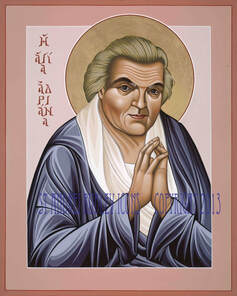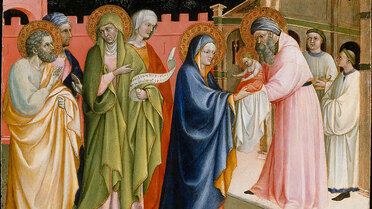 the bounty of the land the bounty of the land Marking important events with a celebration such as anniversaries and jubilees is a custom that many people enjoy. This practice has been part of every culture for millennia, including that of our faith communities. Scripture describes occasions that held special meaning, some prescribed by God and some which were a result of the people’s history. In the Old Testament (Leviticus 25:8-55) we read about the Jubilee years required by God. These years were considered as ‘hallowed’ (holy) and they originally involved releasing those in one’s service, returning to one’s family, returning land to its original owners, and resting from sowing or reaping. Jubilee was marked by special worship throughout the year to express gratitude to God for His many gifts, particularly the bounty of the land. While Jubilee years are celebrated quite differently today, it continues to be tradition in the Church to celebrate a Jubilee year periodically; the next one is in 2025. To prepare for it, Pope Francis has designated 2024 as a Year of Prayer, no doubt to encourage us to become more attuned to our relationship with God, to listen with greater expectation, and to open our hearts to greater love.  our relationhsip with God is the most important relationship we have our relationhsip with God is the most important relationship we have Prayer ought to be a part of our daily lives since our relationship with God is the most important relationship we have. However, there are times when prayer can become difficult insofar as our emotions, thoughts, and even our physical state might act as a source of distraction. Often we struggle to focus because we have many concerns that command our attention, but whatever it is, we must take care to avoid falling into the temptation of thinking that somehow we are a failure at prayer and give up altogether. Let me state this plainly: there is no such thing as a failure at prayer. Any attempt at spending time with God is good prayer. However, what can be an issue for many is how we prioritize prayer in the first place. Quite often we relegate it to a back seat because we think there are many other things that just have to be done. These things probably are important, but for perspective, a challenging, although imperative question to ask ourselves is whether we consider our daily life (and its commitments) a distraction to our prayer, or if we consider prayer a distraction to our daily life. If in honesty we realize it is the latter, this Year of Prayer can offer the opportunity to straighten our priorities and put God back where our hearts really do long for Him to be.  Speak, your servant is listening Speak, your servant is listening If we look to Scripture we will see that God always initiates the invitation for people to meet Him in prayer. A good example is that of the call of Samuel. Twice when God called out, “Samuel, Samuel!” he replied, “Here I am,” and thinking it was Eli who had called, he dutifully ran to his side. When this occurred a third time, Eli realized that it was God calling the boy and so he told Samuel that if he heard the voice again to say, “Speak, Lord, your servant is listening.” (1 Samuel 3:1-4) When God called yet again, Samuel was able to respond, becoming attentive and open to the message of the Lord. Not knowing better at the time, initially Samuel had misguided his response, but once he became aware it was God who called, he was able to communicate directly with Him, enabling him to become a great prophet in the service of God. *  He does call to our heart He does call to our heart Like Samuel, we need to make a similar response to God. Even though it is unlikely that we will hear God’s voice with our ears, He does call to our heart. When we respond, we consciously and intentionally enter into His presence where we will come to know Him more intimately, also receiving the graces He offers to help with handling the many challenges of daily life. Many of the Saints related their insights into the importance of prayer; St. Pope John XXIII expressed it beautifully when he explained why he arose daily at 4:30 AM to pray when he had such full, difficult days. His stated that without this prayer time, it would be impossible for him to handle his packed schedule. He said that the busier he was, the more he needed the prayer. And St. Padre Pio once advised one of his spiritual daughters saying, “You should never give your spirit to your work or to other actions so intensely that you end up losing the presence of God.” ** Both of these saints offer reminders that we need to be regular in our prayer so that our focus is on God who will give all we need to help us remain strong. And what a gift it is that every day our dearest, most faithful Friend, the one who knows us best and loves us the most, is waiting to spend time with us.  our hearts should celebrate our hearts should celebrate This year is an excellent time to prepare ourselves for the Jubilee Year of 2025. The emphasis on prayer offers an opportunity to deepen our relationship with the Lord, no matter what our habits may be presently. It can help with our identity as a community when we come together as one to worship, and it can enliven our works of mercy. Clearly, what we attend to now can become more than just a lifelong ‘habit:’ it can open us to a more intimate relationship with God that will come to complete fruition when we meet Him face to face in Heaven one day. Indeed, our hearts should celebrate. May we commit to a deeper, more intimate life of prayer! May we come to recognize the ‘voice’ of the Lord and respond to Him! May we come to know the love of the Lord more fully! And may we, filled with the graces received in prayer, grow in holiness as a response of love to the Lord! Let us meet in the Heart of Jesus! Peace! ©Michele L. Catanese * Other examples of God calling, a response being made, and God giving a mission: When He commanded Abraham to take Isaac up the mountain for sacrifice God called out, “Abraham!” and Abraham replied, “Here am I.” (Genesis 22:1) Later, when God came to Jacob in a dream He called, “Jacob!” Jacob replied, “Here I am!” (Genesis 31:11). In the Book of Exodus God called out from the burning bush, “Moses, Moses!” and Moses replied, “Here am I.” (Exodus 3:4) This ‘formula’ also appears in the New Testament when Ananias was by God sent to baptize Paul. God called, “’Ananias!’ And he said, ‘Here I am, Lord.’” (Acts 9:10) **From a letter of St. Padre Pio to Raffaelina Cerase, one of his spiritual daughters, December 17th, 1914. Images: 1. Photo taken by my husband; the bounty of the land found in an open air market in Catania, Sicily, Italy. 2. Icon; The Servant of God, Adrienne von Speyr by Fr. William Hart McNichols. Adrienne was a Swiss mystic. One of her books is called The World of Prayer. Another of her books was the result of mystical prayer during which she dictated what she witnessed to her spiritual director, the great theologian Hans Urs von Balthasar. This book is called The Book of All Saints. You can find this icon at https://fineartamerica.com/featured/the-servant-of-god-adrienne-von-speyr-068-william-hart-mcnichols.html 3. Painting; The Voice of the Lord, by James Tissot. This painting depicts young Samuel after he said, "Speak, your servant is listening." 4. My photo; the mountains, taken from around Silverthorne, Colorado. 5. Painting; Festival of Lights, by John Swanson. (1938-2021) Note: In compliance with GDPR rules, I wish to make it clear that I do not gather any information on any of my readers at any time.  to be observant to be observant Something that gives me delight is when I discover an unfamiliar word while reading that impels me to go to the dictionary in search of its meaning. Some of these words are short, others are of the ‘dollar-and-a-half’ variety, but all of them fascinate me (and often beg to be used). One such word came up recently, and after looking it up I wrote the word and definition on a slip of paper, captivated by it. What grabbed my attention was that the meaning and concept behind this word lent itself to the spiritual life, even though in all likelihood it is not ordinarily used this way. The word is perspicacious an adjective which means “having keen mental perception and understanding.” As I have reflected upon it, the thought that keeps returning is that being perspicacious would require one to be observant. Spiritually, to become perspicacious would be to have developed the gift of noticing and listening carefully, reflecting upon that which was seen/heard in order to understand more deeply. Jesus encouraged this practice; on more than one occasion He used the phrase, “he who has ears to hear, let him hear.” (Matthew 11:15; also Mark 4:9, 23).* He also taught that His followers are to be hearers and doers of the word. If we do not hear in the way of openness and reflection, we simply cannot do since we would have no idea what it is we are called to or that a response is even possible. The more we learn to hear in this way, the more our perception and understanding will grow and the more we will be able to make a response to Jesus, the Word made flesh.  developing keen perception...the two prophets recognized Him developing keen perception...the two prophets recognized Him In the just completed Christmas season we welcomed Jesus as God-With-Us; we celebrated because the Son of God took on flesh and made His dwelling among us. We were invited to reflect upon those who recognized Him, some with the help of angels or a star, and others who recognized without being told. Two of the best examples to which we can apply the word perspicacious were Simeon and Anna. Independently of one another they prayed for decades, hearing God’s word within their hearts, developing 'keen perception' such that when the infant Jesus was carried into the Temple in the arms of His mother, the two prophets recognized Him. God had told Simeon that he would not die until after the messiah came. God did not tell him when this would take place, yet Simeon knew who Jesus was when he saw Him. For decades Anna prayed and fasted in the Temple, learning to listen and then respond to the word she must have heard deep within her heart. Indeed, they both had developed keen mental perception and understanding such that they could make a fitting response.**  she understood with her heart she understood with her heart The Gospel proclaimed during the Christmas Day Mass contained the sublime words of St. John: “In the beginning was the Word, and the Word was with God, and the Word was God.”(John 1:1) This statement contains mystery, but meditating upon those words can inspire deeper spiritual understanding of the Word who has always existed and of the eternal plan of God to ‘bend low’ so as to enter our world. As we enter into the season called Ordinary Time all of the Scriptures and the prayers of the liturgy continue to invite us into greater observance, reflectively praying about who our Lord is, what He taught His disciples, and what He wants to say to us now. If we desire to hear and respond, we can observe Mary, the mother of Jesus; the reason she could respond to God was not because she always understood with her mind, but that she understood with her heart as a result of spending her entire life immersed in prayerful pondering. Before Jesus uttered a word of His teaching she knew that only in hearing could she know how to respond, that is, to do. In truth, Jesus exemplified her when He said, “My mother and my brethren are those who hear the word of God and do it.” (Luke 8:21)  Jesus, the Son of God, is The Word Jesus, the Son of God, is The Word St. John stated that Jesus, the Son of God, is The Word.*** Everything Jesus said and did was a message God had (and still has) for His people, but John went deeper: he wants us to know that Jesus Himself is the message of God’s great love for His people. The words of John invite us to immerse ourselves in them so as to reflect, listen, and respond. If we are not sure how to respond, our prayer will open our hearts so the Word can ignite them with His love; that love will direct our response. As we enter into this year, a good practice would be to pray daily with the Gospels, perhaps with a couple of lines or an entire passage, first calling upon the Holy Spirit for assistance in hearing what God is saying. As we reflect on and with the Word, our perception of His Presence will increase and our hearts will lead us to respond fittingly. Immersing in the Word (Scripture) and in The Word (Jesus) will aid us in becoming spiritually perspicacious; that is, our mental perception as well as our perception of heart will increase and grow so that we will have the ears to hear and the heart to respond to His presence. There is no greater Word upon which to center our attention, nor is there one more captivating.  may the Word ignite our hearts may the Word ignite our hearts May we pray for the gift of becoming perspicacious so we can become bearers of The Word to a world so much in need! May we be inspired to make a commitment to growing in relationship with Jesus so as to observe and respond to His call! And may the Word ignite our hearts with His love and direct our response in small and great ways! Let us meet in the Heart of the Word! Peace! ©Michele L. Catanese Note: The Bible translation I have used throughout this post is the RSVCE (Revised Standard Version, Catholic Edition)  ...the better we understand through the power of grace ...the better we understand through the power of grace * There are numerous references made by Jesus in which He said “he who has ears to hear;” all are made with the implication that in listening/observing and discerning through reflection we will come to realize the insights Jesus is attempting to teach. This means we need to spend time in prayer and reflection so that our understanding opens. The more time we spend in prayer, the better we understand through the power of grace. I think this explanation by Jesus explains it best: “… This is why I speak to them in parables, because seeing they do not see, and hearing they do not hear, nor do they understand. With them indeed is fulfilled the prophecy of Isaiah which says: ‘You shall indeed hear but never understand, and you shall indeed see but never perceive. For this people's heart has grown dull, and their ears are heavy of hearing, and their eyes they have closed, lest they should perceive with their eyes, and hear with their ears, and understand with their heart, and turn, for me to heal them.’ But blessed are your eyes, for they see, and your ears, for they hear. Truly, I say to you, many prophets and righteous men longed to see what you see, and did not see it, and to hear what you hear, and did not hear it.” (Matthew 13:10-17) ** We could also say Elizabeth was perspicacious in that she recognized Mary as carrying the Son of God within her womb at the Visitation. And you could say this about her baby, too: the future Baptizer leapt when he heard Mary’s greeting! *** This first sentence from St. John is packed with ‘heavy duty’ theological meaning. In the Greek, Logos is the translation of Word in reference to the Son of God who has come into the world, that is, Jesus. While difficult to fully translate from the Greek, the theological concept indicates that the Word has no beginning or end, and simply has always existed. This is because He (the Son) is God who is eternal with no beginning or end; hence the Word (the Son) has always existed with the Father and is one with the Father. (God is Three Persons and yet One inseparable Godhead.) Images: 1. My photo; dewdrops on fern, taken at Lost Maples State Natural Area, Vanderpool, TX. 2. Painting; Presentation in the Temple, by Alvaro Pirez, (Metropolitan Museum of Art). 3. Icon, Our Lady of Silence by Fr. William Hart McNichols. You can find this at https://fineartamerica.com/featured/our-lady-of-silence-william-hart-mcnichols.html 4. My photo; Holy Bible. 5. My photo; sunset over the Mountains, near Silverthorne, Colorado. 6. My photo of a diamond painting: Mary at Prayer. This was a gift from a dear friend who made it for me. I love that Mary seems to be prayerfully pondering. Note: In compliance with GDPR rules, I wish to make it clear that I do not gather any information on any of my readers at any time. |
Heart Speaks to Heart
|

 RSS Feed
RSS Feed

